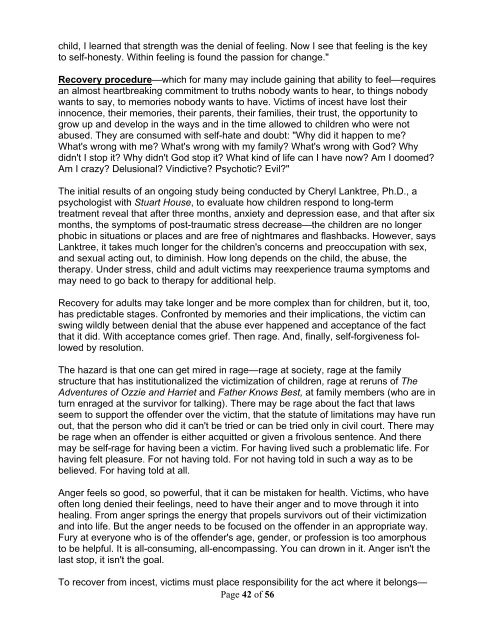Do you want to know what incest is? What it really is? No ...
Do you want to know what incest is? What it really is? No ...
Do you want to know what incest is? What it really is? No ...
You also want an ePaper? Increase the reach of your titles
YUMPU automatically turns print PDFs into web optimized ePapers that Google loves.
child, I learned that strength was the denial of feeling. <strong>No</strong>w I see that feeling <strong>is</strong> the key<br />
<strong>to</strong> self-honesty. W<strong>it</strong>hin feeling <strong>is</strong> found the passion for change."<br />
Recovery procedure—which for many may include gaining that abil<strong>it</strong>y <strong>to</strong> feel—requires<br />
an almost heartbreaking comm<strong>it</strong>ment <strong>to</strong> truths nobody <strong>want</strong>s <strong>to</strong> hear, <strong>to</strong> things nobody<br />
<strong>want</strong>s <strong>to</strong> say, <strong>to</strong> memories nobody <strong>want</strong>s <strong>to</strong> have. Victims of <strong>incest</strong> have lost their<br />
innocence, their memories, their parents, their families, their trust, the opportun<strong>it</strong>y <strong>to</strong><br />
grow up and develop in the ways and in the time allowed <strong>to</strong> children who were not<br />
abused. They are consumed w<strong>it</strong>h self-hate and doubt: "Why did <strong>it</strong> happen <strong>to</strong> me?<br />
<strong>What</strong>'s wrong w<strong>it</strong>h me? <strong>What</strong>'s wrong w<strong>it</strong>h my family? <strong>What</strong>'s wrong w<strong>it</strong>h God? Why<br />
didn't I s<strong>to</strong>p <strong>it</strong>? Why didn't God s<strong>to</strong>p <strong>it</strong>? <strong>What</strong> kind of life can I have now? Am I doomed?<br />
Am I crazy? Delusional? Vindictive? Psychotic? Evil?"<br />
The in<strong>it</strong>ial results of an ongoing study being conducted by Cheryl Lanktree, Ph.D., a<br />
psycholog<strong>is</strong>t w<strong>it</strong>h Stuart House, <strong>to</strong> evaluate how children respond <strong>to</strong> long-term<br />
treatment reveal that after three months, anxiety and depression ease, and that after six<br />
months, the symp<strong>to</strong>ms of post-traumatic stress decrease—the children are no longer<br />
phobic in s<strong>it</strong>uations or places and are free of nightmares and flashbacks. However, says<br />
Lanktree, <strong>it</strong> takes much longer for the children's concerns and preoccupation w<strong>it</strong>h sex,<br />
and sexual acting out, <strong>to</strong> dimin<strong>is</strong>h. How long depends on the child, the abuse, the<br />
therapy. Under stress, child and adult victims may reexperience trauma symp<strong>to</strong>ms and<br />
may need <strong>to</strong> go back <strong>to</strong> therapy for add<strong>it</strong>ional help.<br />
Recovery for adults may take longer and be more complex than for children, but <strong>it</strong>, <strong>to</strong>o,<br />
has predictable stages. Confronted by memories and their implications, the victim can<br />
swing wildly between denial that the abuse ever happened and acceptance of the fact<br />
that <strong>it</strong> did. W<strong>it</strong>h acceptance comes grief. Then rage. And, finally, self-forgiveness followed<br />
by resolution.<br />
The hazard <strong>is</strong> that one can get mired in rage—rage at society, rage at the family<br />
structure that has inst<strong>it</strong>utionalized the victimization of children, rage at reruns of The<br />
Adventures of Ozzie and Harriet and Father Knows Best, at family members (who are in<br />
turn enraged at the survivor for talking). There may be rage about the fact that laws<br />
seem <strong>to</strong> support the offender over the victim, that the statute of lim<strong>it</strong>ations may have run<br />
out, that the person who did <strong>it</strong> can't be tried or can be tried only in civil court. There may<br />
be rage when an offender <strong>is</strong> e<strong>it</strong>her acqu<strong>it</strong>ted or given a frivolous sentence. And there<br />
may be self-rage for having been a victim. For having lived such a problematic life. For<br />
having felt pleasure. For not having <strong>to</strong>ld. For not having <strong>to</strong>ld in such a way as <strong>to</strong> be<br />
believed. For having <strong>to</strong>ld at all.<br />
Anger feels so good, so powerful, that <strong>it</strong> can be m<strong>is</strong>taken for health. Victims, who have<br />
often long denied their feelings, need <strong>to</strong> have their anger and <strong>to</strong> move through <strong>it</strong> in<strong>to</strong><br />
healing. From anger springs the energy that propels survivors out of their victimization<br />
and in<strong>to</strong> life. But the anger needs <strong>to</strong> be focused on the offender in an appropriate way.<br />
Fury at everyone who <strong>is</strong> of the offender's age, gender, or profession <strong>is</strong> <strong>to</strong>o amorphous<br />
<strong>to</strong> be helpful. It <strong>is</strong> all-consuming, all-encompassing. You can drown in <strong>it</strong>. Anger <strong>is</strong>n't the<br />
last s<strong>to</strong>p, <strong>it</strong> <strong>is</strong>n't the goal.<br />
To recover from <strong>incest</strong>, victims must place responsibil<strong>it</strong>y for the act where <strong>it</strong> belongs—<br />
Page 42 of 56


